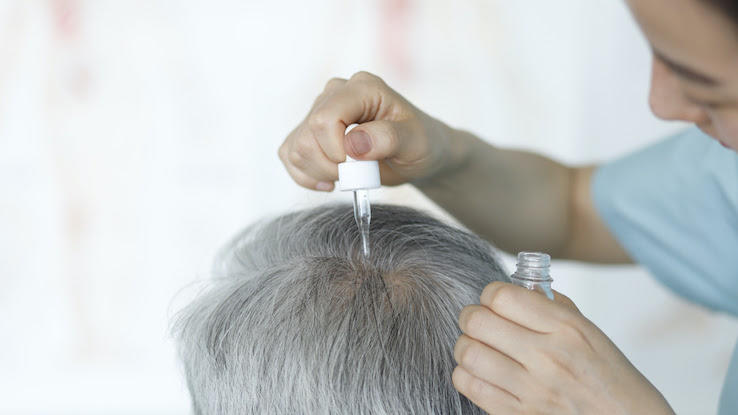Gaps Diet and Hair Loss

Millions of Americans have some degree of hair loss, or balding. As the science of gene mapping progresses, researchers continue to discover new genes related to baldness as they pursue treatment methods for the condition. More than 80% of cases of baldness are thought to be genetic and inherited from a parent. But, there are actually several different types of baldness, and each type is related to other genes.

The genes related to baldness directly determine the type of baldness. Many types of baldness are not genetic, and with treatment, you can reverse them.
Androgenetic Alopecia (AGA)
Also known as male-pattern baldness, a gene variation in the androgen receptor (AR) can cause this type. It's most likely passed down from mothers to their children. Researchers have found some variants in DNA that, along with the genetic variability in the AR, raise the risk that a man may develop AGA sevenfold. This means that one in seven men has the potential to develop this type of baldness.
Hereditary Hypotrichosis Simplex
This type of baldness results in hair thinning. Scientists have isolated a gene, called APCDD1, that causes hair follicles to shrink. This can happen even in childhood. Other genes that may play a role in this type of baldness are called RPL21 and Sox21. Researchers have found that when Sox21 gene activity is blocked, hair falls out during laboratory tests.
Female Androgenetic Alopecia
This is a type of female-pattern baldness that can cause thinning hair throughout the top and sides of the head. Unlike male androgenetic alopecia, the hairline will typically remain the same. Completely losing your hair is unusual with this condition.
Researchers still don't understand this type of baldness well. Although the same variants to DNA molecules as AGA may play a role, the link isn't as strong as it is in men. This has led researchers to believe that other genes may play a role in female androgenetic alopecia.
Treatment Options for Baldness

The good news, especially for people with androgenetic alopecia, is that there seems to be a correlation between men who go bald and prostate cancer. Researchers at the University of Washington in Seattle say that men who begin developing male-pattern baldness early in their lives are more than 40% less likely to develop prostate cancer.
There are several ways to treat baldness, and they don't all require a prescription from your doctor.
Topical medications
Topical treatments include foams, liquids, creams and shampoos that you apply directly onto your scalp. They contain medicines like minoxidil, which can stimulate your hair follicles to grow more hair. You'll want to talk to your healthcare provider before starting this type of treatment. It can cause irritation and side effects, depending on how sensitive your body is to the medication.
Finasteride
This is a pill that doctors can prescribe for male-pattern baldness. Women shouldn't take it because of the risk of congenital disabilities.
Wigs and Hairpieces
Wig technology has come a long way. Many wigs and hairpieces are so expertly made — and so realistic — that you don't have to remove them, even when you're going swimming or doing other vigorous activities. They may suction directly onto your head, or you may be able to use silicone strips inside the wig cap so the hairpiece grips your scalp.
Surgery
There are a few different surgery options available. These include hair transplants and scalp reduction surgery, which removes some of the bald areas of your scalp and stretches the rest of your scalp with hair to fill in the patchy areas. The drawback is that surgery is usually expensive, and you do run the risk of developing infections.
Hair loss doesn't have to affect your self-esteem. The science of genetic hair loss is progressing, and as scientists discover more genes linked to baldness, they can begin to use this information to find more helpful treatment options.
Resource Links:
"Baldness and Risk of Prostate Cancer in the Health Professionals Follow-up Study," American Association for Cancer Research
"Combination Approaches for Combatting Hair Loss," National Library of Medicine
"Androgenetic Alopecia," National Library of Medicine
"Alopecia areata," National Library of Medicine
"Genetics and other factors in the aetiology of female pattern hair loss," National Library of Medicine
"Genetic and molecular aspects of androgenetic alopecia," National Library of Medicine
MORE FROM SYMPTOMFIND.COM
Source: https://www.symptomfind.com/health/baldness-gene-hair-loss?utm_content=params%3Ao%3D740013%26ad%3DdirN%26qo%3DserpIndex
0 Response to "Gaps Diet and Hair Loss"
Post a Comment